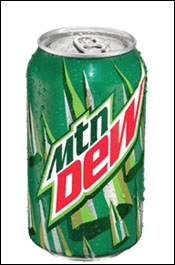Mountain Dew Will Dissolve Rats On Contact
Revolting affidavit details drink's acidic power

View Document
JANUARY 3--Defending itself from a lawsuit claiming that an Illinois man found a dead mouse inside a can of Mountain Dew, PepsiCo contends that a rodent would have disintegrated and been transformed into a “jelly-like” substance between the time of the soft drink’s bottling and the day the plaintiff reportedly purchased the soda from a vending machine at his office.
In a court response to a motion filed by Ronald Ball--who claims to have found the dead mouse in a Mountain Dew can about three years  ago--PepsiCo filed a fascinating/revolting affidavit from Lawrence McGill, a veterinarian who noted that he was “familiar with the effects an acidic fluid, such as common soda drinks including Mountain Dew, will have on mice and other animals.”
ago--PepsiCo filed a fascinating/revolting affidavit from Lawrence McGill, a veterinarian who noted that he was “familiar with the effects an acidic fluid, such as common soda drinks including Mountain Dew, will have on mice and other animals.”
According to McGill, if a mouse is submerged in Mountain Dew between four and seven days, the rodent “will have no calcium in its bones and bony structures.” During those days of soft drink immersion, “the mouse’s abdominal structure will rupture.” Additionally, “its cranial cavity (head) is also likely to rupture within that time period,” McGill noted.
After 30 days exposure to Mountain Dew, “all of the mouse’s structures” would have disintegrated to the point that it would not be recognizable. In fact, “the mouse will have been transformed into a ‘jelly-like’ substance.” The only part of the rodent that could possibly survive, added McGill, was “a portion of the tail.”
 PepsiCo contends that Ball, 52, opened his can of Mountain Dew 74 days after it was bottled at a PepsiCo facility in St. Louis. The company alleges that Ball has provided “no evidence” that the mouse was inside the can when it was sealed in August 2008.
PepsiCo contends that Ball, 52, opened his can of Mountain Dew 74 days after it was bottled at a PepsiCo facility in St. Louis. The company alleges that Ball has provided “no evidence” that the mouse was inside the can when it was sealed in August 2008.
In his Illinois Circuit Court lawsuit, which is pending in Madison County, Ball alleges that he opened the Mountain Dew can, “took a drink, and immediately became violently ill such that he began to vomit.” Subsequent to Ball being stricken, “the contents of said can of Mountain Dew were immediately poured into a styrofoam cup wherein a dead mouse was found.”
The rodent was eventually turned over by Ball to a PepsiCo insurance adjuster. McGill, pictured above, subsequently examined the animal and concluded that it was a young mouse or rat, no older than four weeks old at the time of its death. The rodent, according to his affidavit, had not even been born when the Mountain Dew can was sealed, and was already dead when it “entered the Mountain Dew fluid.”
McGill reported that the pH level of Ball’s Mountain Dew can was 3.43, which according to the veterinarian “indicates the fluid was acidic and within the normal range for Mountain Dew.” (5 pages)











